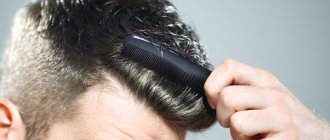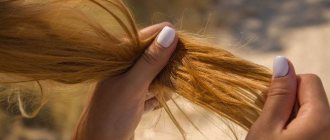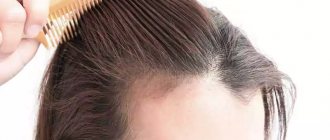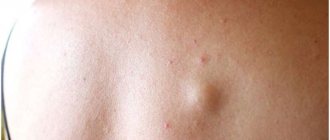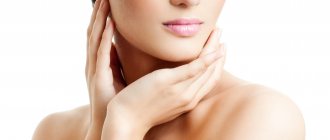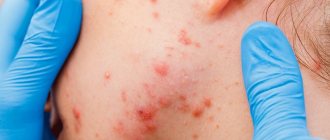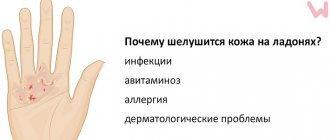Often people, regardless of gender, are faced with the problem of an itchy scalp, which is sometimes accompanied by uncontrolled hair loss. These unpleasant symptoms cause severe discomfort to a person, disrupting the usual way of life and indicate health problems as a result of improper care or the development of a disease. You cannot ignore unpleasant signs, as they will only get worse in the future.
Sometimes it is possible to determine the exact reason why your head itches through a visual examination; in other cases, this can only be done by an experienced specialist. Therefore, the effectiveness and duration of therapy directly depends on how accurately the provoking factor was identified. The sooner treatment begins, the faster the unpleasant symptoms will disappear, since it is easier to stop any pathological process at the initial stage. Depending on the identified cause, different treatment methods are used.
- Drug therapy
Main features
The symptoms of seborrheic alopecia are similar to those of seborrhea, since both diseases are caused by a malfunction of the sebaceous glands. The main features include:
- unpleasant odor;
- rapid loss of freshness and cleanliness of hair after washing;
- thickened layer of keratinized skin;
- presence of inflammation.
Increased activity of the sebaceous glands leads to the appearance of excess oil on the skin. Sebaceous ducts and hair follicles become clogged. Horny particles accumulate on the scalp, face, and body. They stick together and form a viscous mass. This environment is good for fungal growth. The parasite becomes active, attacks the hair follicles, the hair becomes weak and begins to fall out.
There are three main types of seborrhea: dry, oily and mixed. Alopecia occurs with oily skin.
Message sent!
Stages of psoriasis on the head
The disease lasts a long time, exacerbations are replaced by remissions. The frequency of exacerbations and the severity of symptoms depend on the presence of provoking factors.
Progressive stage
Rash and inflammation spread, accompanied by severe itching. In the initial stage, Koebner's symptom is present - the appearance of psoriatic rashes at the site of scratches and abrasions.
Stationary
The process is in the same state, not spreading, but not dying out.
Regressive
The process gradually subsides, the itching disappears, the rash turns pale, the inflammatory infiltrate decreases, gradually taking on the appearance of a spot; the color of the rash fades starting from the center, forming ring-shaped figures with a brighter border. Sometimes they begin to turn pale from the periphery to the center and then take on the appearance of whitish rings (a symptom of psoriasis on the head - Voronov's pseudoatrophy). The healing phase can take quite a long time and gradually only white depigmented spots remain on the skin.
Causes
Oily seborrhea can appear at any age. However, most often this occurs in adolescence and during hormonal imbalances in the body. Baldness is a consequence of chronic seborrhea, which can last for about five years without any serious consequences.
To begin adequate therapy, it is important to identify and eliminate the root cause of sebaceous gland dysfunction. It could be:
- failure of the endocrine system;
- disorders in the autonomic system;
- long-term drug treatment;
- hormonal disorder;
- hereditary predisposition;
- improper metabolism;
- poor nutrition;
- some diseases and complications of diseases.
Before starting treatment for baldness, it is important to conduct a medical examination to identify possible underlying causes.
Summing up
If your head has been itching for more than a day, then do not ignore it even if baldness has not yet begun. Try to find out as soon as possible why the irritation appeared and eliminate its causes. And start monitoring how many hairs remain on the comb even after washing. When daily losses exceed 100-150 units, this is already a cause for alarm.
Watch your diet and avoid extreme fatigue. Even in our time of constant stress, we need to find ways to cope with them correctly and the opportunity to relax. This is especially true for men who tend to hold back negative emotions, and then begin to constantly scratch their heads out of nervousness.
Take a quality multivitamin twice a year during the off-season. They will help strengthen your immune system and improve the condition of your hair. And don’t hesitate to seek help from a doctor, even if the problems don’t seem too serious to you yet.
Characteristic symptoms of seborrhea
Seborrheic dermatitis is characterized by a range of symptoms.
Bold form:
- frizzy, sticky hair;
- greasy shine;
- increased oiliness of facial skin;
- the appearance of redness, ulcers on the face, head and back;
- dandruff;
- seborrheic growths.
Dry form:
- tight, dry skin on which wounds easily form;
- dry hair;
- fragility, weakness of hairs;
- loose dandruff.
In both cases, itching may be present. The patient wants to scratch the skin all the time. Sometimes there is a feeling of soreness on the skin. With severe manifestations, wounds and ulcers that occur when scratching are possible.
Complications of seborrhea
Alopecia does not begin to manifest itself immediately. First, redness and dandruff appear on the scalp. At the next stage, the nutrition of the hair follicles is disrupted. This is due to roughening of the skin and sebaceous layers. At the last stage, hair follicles begin to die, hair thinning is noticeable and its growth stops, and restoration becomes difficult.
With seborrhea, hair rarely falls out completely. However, the remnants of hair look very unpresentable. This appearance causes psychological disorders and makes it difficult to communicate with people.
Features of proper nutrition
Alopecia and itching will be a consequence of the body not receiving the necessary nutrients and vitamins. People often complain about them while dieting. To prevent bald spots from appearing on your head, you need to pay close attention to your diet.
Firstly, you need to forget about fast food, salted, smoked, pickled foods. Eating sweets, sweet carbonated drinks, strong coffee, and tea does not benefit your hair or skin. Bad habits, alcohol, smoking also cause skin problems and this is the cause of hair loss.
To overcome alopecia, it is worth increasing the amount of protein entering the body. Hair mainly consists of keratin, and this is protein; food rich in proteins will affect the beauty of your hair in a short time. In order for proteins to be absorbed better, it is recommended to combine them with a small amount of lemon juice.
Despite following a diet or proper nutrition principles, the hair and scalp will feel a lack of fat. They should be present in every person's diet. Flax, corn, and wheat germ oil will help with this. They are suitable for dressing fresh vegetable salads.
For hair to be beautiful and strong, it needs microelements:
- Iodine;
- Calcium;
- Iron;
- Zinc;
- Selenium.
It has been proven that the greatest amount of these elements is found in different types of nuts, beans, the meat of some birds, and seafood. Beef liver, kidneys, cheese, dairy products, and mushrooms are rich in iron and selenium. You can compensate for the lack of iodine with seaweed and fish.
Methods of therapy
With seborrheic dermatitis, hair can fall out both on the entire surface of the head and in certain areas (on the back of the head, temples, frontal part). It is better to prevent the problem from developing; it is very important to intervene at an early stage. The treatment is simple. However, the process is very lengthy and requires patience, an integrated approach and consistency. Work is being carried out in a number of areas:
- organization of proper nutrition;
- use of special hair care products;
- physiotherapy;
- drug treatment.
Diet for scalp psoriasis?
There is no special diet, but treatment of psoriasis of the scalp involves proper 4 meals a day containing all the ingredients necessary for the body. Products that irritate the skin should not be present on the table:
- spicy, salty, sour;
- fruits rich in essential oils (fresh garlic and onions, radishes);
- fried, smoked, canned foods;
- caffeine-containing drinks – strong tea, coffee, Coca-Cola, etc.;
- alcoholic drinks – they contribute to the development of relapses of the disease.
It has been established that meat foods provoke an exacerbation, so the diet should contain more foods containing complex carbohydrates, lean meat, cottage cheese, yogurt, etc.
Fighting oily seborrhea
If the doctor has determined oily seborrhea, then in terms of nutrition you will need:
- exclude smoked meats and pickles, as well as cakes, sweets, cookies and other sweets;
- do not eat canned and pickled foods, as they provoke itching and deterioration of the skin;
- eat fresh vegetables and fruits;
- eat enough fiber, fish dishes, cereals, meat;
- refuse flour products;
- limit consumption of foods containing animal fat.
Prevention
To avoid the development of pathologies that lead to baldness, you need to:
- Normalize living conditions, avoid stress.
- Avoid drinking alcohol and do not use medications without a doctor’s prescription.
- Do not apply cosmetics of unknown brands (especially creams).
- Avoid using aggressive hair dye, choose the right concentration of oxidizer, or use the services of a professional.
- Normalize the regularity of sexual activity, avoid long intervals and the development of hormonal instability.
- Do not overuse tampons during your period. It is advisable to alternate their administration with the use of pads.
- Use combs with non-traumatic bristles.
- Introduce fresh vegetables, fruits, and herbs into your diet.
- Avoid using pillows filled with feathers. Such an environment is favorable for the life of mites that cause demodicosis.
- Eliminate from the diet foods containing stabilizers, dyes, thickeners and other artificial components. They negatively affect the liver, inflame and destroy its cells, which is accompanied by hair loss.
- Always use condoms when having sex with a new sexual partner. This will allow you to avoid inflammatory diseases of the urogenital tract, which cause fragility of the hair shafts and rejection of the follicles.
- Always wear a hat when the temperature is low.
- Give up the habit of aimlessly scratching your scalp.
- Avoid being in a draft or getting wet in cold rain.
If you have a hereditary predisposition to various diseases, you should regularly visit a doctor of the appropriate profile and undergo examination.
General principles of treatment
In complex cases of seborrheic dermatitis, doctors prescribe medications to improve digestion and improve metabolism. Therapy often also includes vitamins, minerals, and hormonal pills.
Depending on your medical history, your doctor may prescribe hair growth activators. For oily seborrhea, drying shampoos containing tar, sulfur or salicylic acid are used.
A specialist may prescribe the use of balms with moisturizing and nutritional components - amino acids, keratin, protein.
There are two main groups of care products that can stop hair loss due to seborrhea:
- stopping the formation of dandruff;
- stimulating hair growth.
The first includes antifungal shampoos, lotions, and scrubs. It is important to use them in accordance with the instructions. The second group includes herbal tinctures, masks, and oils for rubbing into the scalp. Their task is to strengthen hair and stimulate growth.
Why are fungal diseases dangerous?
The cause of severe itching can be a fungal disease. When visiting a doctor, a special culture is done for the fungus. The sooner treatment begins, the better. In advanced cases, the skin becomes weakened and dandruff appears.
For fungal problems, the doctor prescribes the following remedies:
- A special shampoo with an antifungal effect or with salicylic alcohol, which dries out the skin.
- Rinse with a solution of water and apple cider vinegar.
- Special pastes and ointments for fungus, which are applied to the affected areas.
It is important not to interrupt the course of treatment. Otherwise, the fungus will begin to multiply again and dandruff will appear. Sometimes medications are prescribed to enhance immunity.
Ringworm is a special case of fungal infection.
Healing oils
Oil therapy can be used for hair loss only after consultation with a specialist. Also, you should not choose masks for home preparation on your own if you are not sure that the composition will not harm hair weakened by seborrhea.
When treating alopecia, rose, flaxseed, lavender and castor oils may be recommended. They can be mixed with decoctions or herbal infusions and rubbed into the scalp. Lotions are made with oils and alcohol tinctures to help eliminate itching and redness.
In the presence of ulcers, oil wraps often help, as they restore metabolic processes in the scalp and hair follicles. Foci of inflammation, for example, are treated with oil solutions of vitamins A and E.
Emergency measures to prevent baldness
The causes of itchy scalp can be different, but mainly it is the colonization of pathogenic microorganisms - fungal infections. From childhood, it is necessary to instill in children an attentive attitude towards themselves. Children lead a group lifestyle until they enter adulthood. Most people, having reached old age, do not observe the rules of personal hygiene.
At any age, you need to remember that each of us has an individual microflora. Therefore, you should not use other people’s toothbrushes, towels, combs, dishes, clothing or bed linen. Fungal infections can be easily picked up on sea beaches, in swimming pools, in crowded places and in public places. The causes of the disease cannot always be determined quickly, which can complicate the treatment of the disease and cause complications.
Timely care of the scalp guarantees health, which certainly determines the quality of a person’s life.
If baldness is caused by infectious agents, then further hair loss can be prevented by eliminating the pathogen. The doctor will prescribe special antifungal, antiseptic and antibacterial ointments and lotions for external treatment of affected skin areas.
IMPORTANT! In case of microtraumas of the skin caused by mechanical factors: burns, tight weaves, first of all, you need to soothe the skin. Relaxing massages using essential oils and healing masks for the scalp are suitable. In the near future, we will have to give up electrical appliances for hair styling and tight hairstyles.
Unfortunately, with alopecia areata, it is impossible to stop the process of hair loss. However, with special preparations based on minoxidil, it is possible to make hairs in areas of baldness grow again in a few months.
Hair care during the treatment of seborrheic loss
Homemade masks and decoctions, selected together with a doctor, are a good help in the treatment of seborrheic hair loss. For example, you can use these tips:
- infusions and decoctions of oak bark and chamomile are suitable for disinfecting the skin;
- softening and nutrition - burdock root;
- drying - lemon water, soda water, a decoction of string;
- softening - a decoction of celandine or onion peels.
Warming masks have a beneficial effect. They stimulate blood circulation and accelerate hair growth. For such masks, take red pepper, onion, and mustard.
It is not recommended to wash your hair every day, as this can dry out your skin. If your hair quickly becomes oily at the roots, then you need to wash it 2-3 times a week, and dry hair once is enough.
Demodicosis and pediculosis
The main cause of these diseases is damage to the scalp by parasites:
- demodex mite;
- lice.
Most often, parasites appear in hair due to lack of hygiene or infection from other people. Therefore, doctors do not recommend using someone else's combs. Lice can be acquired through household means, for example from bedding or furniture. Medicines for the treatment of these diseases will be prescribed by a dermatologist after a visual examination of the patient. It is believed that the itching stops in the first days of treatment, and then the hair stops completely.
